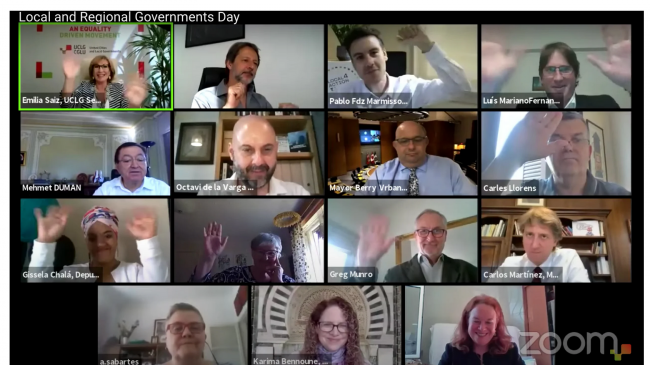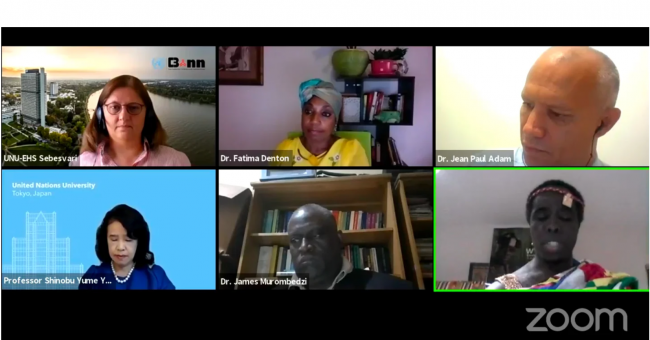The following events were covered by IISD on Friday, 10 July 2020:
-
Local and Regional Governments Day Event: Accelerating Transformation from the Ground-up in a Post-COVID Era
-
Managing “Stranded” Assets Risks and Opportunities: Moving Towards Decarbonized Economies and Inclusive Growth in Africa
Local and Regional Governments Day Event:
Accelerating Transformation from the Ground-up in a Post-COVID Era
Presented by United Cities and Local Governments (UCLG)
This Local and Regional Governments (LRG) Day virtual event took place on the sidelines of the High-level Political Forum on Sustainable Development (HLPF). The event presented the benefits of establishing a joint agenda between local, national, and international levels to bolster local action and accelerate implementation of the 2030 Agenda for Sustainable Development.
During the event, LRG representatives highlighted the need for investments that support universal access to essential public services, green recovery, and revamped multilateralism to achieve the SDGs in the post-COVID-19 era. Participants discussed the LRG constituency’s Joint Statement to the 2020 High-level Political Forum on Sustainable Development (HLPF) and defined priorities for the post-COVID-19 period. The event also marked the launch of a UCLG report, titled Towards the Localization of the SDGs.
Opening the event, Emilia Saiz, UCLG Secretary General, explained that the purpose of the LRG Day is to amplify the voices of elected officials of cities, regions, and territories in international fora. Saiz noted the report and UCLG’s Live Learning Experience illustrate that post- COVID-19 recovery efforts represent an opportunity to build back better, leave no one behind, and create a world driven by communities.
UCLG Co-President Jan Van Zanen, Mayor of The Hague, the Netherlands, cited the key role of local governments in ensuring a more sustainable COVID-19 recovery. He said the 2030 Agenda provides them with the blueprint to do so. Bernat Solé, Regional Minister for Foreign Action, Catalonia, highlighted that local actions have global consequences. Marina Ponti, Director, UN SDG Action Campaign, announced the September launch, with UCLG, of a global mobilization campaign for local and regional actors on the occasion of the UN’s 75th anniversary.
In the ensuing discussions, LRG representatives reaffirmed the importance of the 2030 Agenda and the Paris Agreement on climate change in guiding all recovery efforts. Participants also highlighted the importance of multilateralism and the need for collaboration across all levels of government and stakeholders. UCLG Co-President Li Mingyuan, Mayor of Xi’an, China, called for knowledge sharing among LRG and collaboration with international institutions during the post-COVID-19 rebuilding process. Luca Bergamo, Vice Mayor of Rome, Italy, stressed the need for a renewed UN.
On common challenges exacerbated by COVID-19, many participants identified revenue generation as a growing problem for LRG. Several participants, including Madelaine Y. Alfelor-Gazman, Mayor of Iriga, the Philippines, and Eugène Aouélé Aka, President of the Association of Regions of Côte d’Ivoire, mentioned that LRG in developing countries face a particular challenge in localizing the SDGs, given high poverty and illiteracy rates. Many LRG representatives identified a lack of policy coherence and coordination between LRG and different levels of government as a barrier to effective management of the pandemic. They highlighted that international organizations, like UCLG, can serve as catalysts for cooperation.
Many participants cautioned that the COVID-19 crisis has deepened gender inequality. Sabine Freizer, UN Women Regional Advisor for Governance, Peace and Security for Europe and Central Asia, emphasized that immense efforts will be needed to ensure gender inequality is addressed in COVID-19 responses and recovery, to be able to “build back better.” Laia Bonet, Deputy Mayor of Barcelona, Spain, called for establishing gender violence protection programmes. Gissela Chalá, Vice Mayor of Quito, Ecuador, urged the inclusion of gender considerations in local budgeting when rethinking cities.
LRG representatives also observed the increased demand for digital transformation at the local and regional levels as a result of the pandemic. Rohey Malick Lowe, Mayor of Banjul, The Gambia, said COVID-19 affected political activity, decision making, and service delivery as it revealed the local government’s challenges regarding access to technology. Aleksandr Zhirkov, First Deputy Chairman, State Assembly, Republic of Sakha, Russian Federation, said digitizing cities and regions is essential for post-COVID-19 recovery efforts and SDG implementation, particularly for remote regions and communities. Several participants, including Luis Mariano Fernández, Secretary General of ZICOSUR (which brings together 55 subnational governments from Argentina, Brazil, Bolivia, Paraguay, Chile, Peru, and Uruguay), and Fernando Gray, Mayor of Esteban Echeverría, Argentina, emphasized that digitization must be inclusive and not lead to increased inequalities.
Addressing the rebuilding of societies and economies after COVID-19, Berry Vrbanovic, Mayor of Kitchener, Canada, noted the need for a people-centric development model. Several participants, including Pudence Rubingisa, Mayor of Kigali, Rwanda, and Carola Gunnarsson, Lord Mayor of Sala Municipality, Sweden, called for an inclusive recovery that tackles inequality and engages all stakeholders. They urged focusing on the most vulnerable who need the most support. Almudena Maillo, Councilor of Madrid, Spain, said the LRG Joint Statement to the HLPF should further the economic recovery of cities and prioritize the economic SDGs, namely SDGs 8 (decent work and economic growth), 9 (industry, innovation, and infrastructure), and 11 (sustainable cities and communities). Karima Bennoune, UN Special Rapporteur in the field of Cultural Rights, called for providing expedited financial support to artists and cultural practitioners to preserve cultural expression.
On the need for a resilient and sustainable recovery, Carla Montesi, Director, Directorate General for Development and Cooperation, European Commission, said recovery should be green, digital, just, and resilient. Mohamed Saadie, Co-President, UCLG Middle East and West Asia Section (UCLG-MEWA), and President, Union of Dannieh Municipalities, Lebanon, underscored that a sustainable recovery requires reconsideration of economic and consumption models of cities.
On the need to rethink governance moving forward, Pablo Jurado Moreno, President of the Consortium of Provincial Autonomous Governments from Ecuador, said the pandemic revealed the necessity of decentralizing governance. Pilar Díaz Romero, Mayor of Esplugues de Llobregat, Spain, called for building a multi-level governance system that promotes effective cooperation between different levels of government. Greg Munro, Secretary-General, Commonwealth Local Government Forum, called for reconstructing the international system with local governments at the forefront of sustainable development and SDG implementation.
Closing the meeting, Mehmet Duman, UCLG-MEWA Secretary General, expressed hope that LRG will further their efforts in localizing the SDGs. He invited participants to widely share the Towards the Localization of the SDGs report to support those efforts.
This discussion on the role of LRG in SDG implementation took place on 10 July 2020. The topic was also addressed in a UCLG event on 8 July. A final UCLG event, which will convene on 13 July, will illustrate the elements essential for the kickoff of the Decade of Action from the perspective of the LRG constituency in the post-COVID-19 recovery.
Contact
Alejandra Salas | a.salas@uclg.org
More Information
Managing “Stranded” Assets Risks and Opportunities: Moving Towards Decarbonized Economies and Inclusive Growth in Africa
Presented by the UNU Institute for Natural Resources in Africa (UNU-INRA), UNU Institute for the Advanced Study of Sustainability (UNU-IAS), UNU Institute for Environment and Human Security (UNU-EHS), UN Economic Commission for Africa (ECA), and UN Department for Economic and Social Affairs (UN DESA)
This event, held virtually on the sidelines of the 2020 High-level Political Forum on Sustainable Development (HLPF), discussed risks associated with transitioning away from fossil fuels, and opportunities for diversification and sustainable development in Africa. The event also drew on strategies from developed countries, such as Japan, and ways in which a just recovery can be achieved through international solidarity.
The session built on the UNU-INRA’s report on African Development in the Age of Stranded Assets. This report discusses Africa’s development in light of potential asset stranding, in the hopes of alerting African governments to the need for effective natural resource planning to achieve lower-carbon economies.
Presenting a keynote message on behalf of Okyenhene Osagyefuo Amoatia Ofori Panin, King of Akyem Abuakwa, Ghana, Osabarima Owusu Baafi Aboagye III, Chief of Akyem Dwenase, he emphasized the importance of access to affordable and clean energy for Africa’s sustainable development, including for poverty reduction, good health and wellbeing, and clean water. He said Africa’s policymakers must avoid the risk of stranded hydrocarbon resources and find ways of utilizing these resources to drive the continent’s industrialization agenda.
Shinjiro Koizumi, Minister of the Environment, Japan, reported on his country’s announcement to tighten restrictions in exporting coal-fired energy power to developing countries. He highlighted support for large-scale solar energy projects in Kenya and Ethiopia. He also mentioned partnerships with developing countries to support the Sustainable Development Goals (SDGs) through integrated policy approaches.
Setting the scene for the panel discussion, Fatima Denton, Director, UNU-INRA, said COVID-19 has created major problems for hydrocarbon-dependent economies, as global oil prices have plummeted. She explained Africa faces a paradox of plenty with rich hydrocarbon and mineral resources, while remaining largely energy poor. She highlighted the need to, inter alia:
- decouple economic growth from carbon intensive investments;
- scale up solar PV deployment;
- harness renewable energy potential;
- invest in digital economies; and
- unlock climate finance.
Panelists then addressed ways to manage the risks of stranded assets and opportunities of green transitions in Africa.
James Murombedzi, African Climate Policy Center (ACPA), ECA, said advanced economies, with higher historical and current emissions, should be required to decarbonize at a higher rate than African countries. He emphasized the need for Africa to utilize hydrocarbons, coupled with renewable energy transition, to support its development agenda.
Minoru Takada, UN DESA, called for policies and investments for clean and affordable energy in Africa. He said massive exploitation of renewables is key for the continent. He noted the importance of public sector investment to leverage private investment in clean energy solutions.
Panelists then discussed ways to ensure green transitions in urban spaces and support sustainable cities in Africa.
Zita Sebesvari, Director, UNU-EHS, said decarbonization creates green jobs. She emphasized transformative research should support transformative change on pathways to sustainable actions for zero net carbon emissions.
Shinobu Yume Yamuguchi, Director, UNU-IAS, urged inclusion of measures to reduce greenhouse gases in COVID-19 recovery strategies. She said many African countries view decarbonization as a costly endeavor. She highlighted the need to break silos in policymaking, and follow diverse pathways that include renewable energy. She mentioned the Satoyama Initiative, which provides solutions through integrated landscape and seascape approaches to build resilience of societies and expand nature’s economic benefits to people.
During the ensuing discussions on mobilizing support for green transition in Africa, panelists emphasized:
- the need to contain illicit financial flows;
- ownership of and benefits from resources;
- increased investment in renewable energy; and
- inclusion of recent research findings in educational programmes to stimulate transformative change.
In concluding remarks, Session Chair Jean Paul Adam, Director, Technology, Climate Change and Natural Resources Management, ECA, said carbon-intensive activities must increase in Africa to reindustralize the continent and ensure a just green transition. He added that decarbonization solutions must prioritize improving the lives of the African people.
The event took place on 10 July 2020 in a virtual format due to the COVID-19 pandemic.
Contact
Moyo Qondi, UNU-INRA | moyo@unu.edu
Nicholas Turner, UNU-IAS | turner@unu.edu
Nadine Hoffman, UNU-EHS| hoffmann@vie.unu.edu

